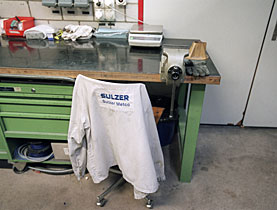Recruiters making do with slimmer pickings

In an era of large-scale redundancies, short-time working and a virtual hiring freeze in some areas, recruitment firms are coming under increasing pressure to perform.
Having ridden the boom in recent years, it was only a matter of time before recruiters began to feel the pain of the downturn, as illustrated by Swiss-based Adecco’s dramatic second quarter loss reported on Tuesday.
The world’s largest staffing company announced a second-quarter net loss of €147 million (SFr225 million) with revenues down by almost a third. Analysts had been forecasting a profit of €29 million.
The tumble was a sharp contrast to the same period last year when the group recorded a net profit of €212 million.
Now large international recruiters like Adecco, along with rivals such as USG People, Hays and Michael Page, are themselves cutting jobs to protect profitability.
Jobs in jeopardy?
Although Adecco has its headquarters in Zurich, Switzerland is by no means the most problematic country for the group in terms of decline in revenue. That dubious honour goes to France.
The Swiss unemployment rate rose to 3.7 per cent in July, with 145,364 people out of work, according to the State Secretariat for Economic Affairs (Seco).
This is not quite an historic high, as the same level was most recently reached in 2006. However some commentators speak of a further 80,000 jobs in jeopardy in the next 12 months.
But Switzerland is something of a special case when it comes to the labour market, as George Sheldon, economics professor at Basel University told swissinfo.ch.
Sheldon also disputes the predictions of unemployment topping 5.5 per cent in 2010. “I think that’s way too high. My indicators show that presently, looking at the dynamics in the system, it probably won’t go over 4.2 per cent.”
“There’s basically always a latent labour shortage in Switzerland over the long term. If you look back from the 1970s to the present there has always been an influx of workers,” Sheldon explains.
Give and take
The professor also points to short-time working and the generous but strict unemployment insurance system as factors which will continue to mitigate the effects of the economic crisis on the labour market.
“There is that give and take. It’s a very generous system in terms of the level of benefits. The maximum insured annual income is SFr108,000 and if you have dependents you can get up to 80 per cent of that, although it’s taxable.
On the other hand you have to show proof that you are looking for a job. The Swiss are much more resolute in monitoring this.”
Although Sheldon agrees that there has been a net shedding of jobs across the board, he says it doesn’t mean that no new staff are being taken on.
“It could very well be that firms are cutting back in one area while increasing in another. Looking across the whole industry there are more people being let go than taken on but it’s a two-way street.”
Positions vacant
So where does this leave recruiters? Clearly less busy than before. In its most recent quarterly jobs market barometer published in June, online recruiter Manpower found employers were facing the third quarter of this year with uncertainty.
Of the 775 Swiss employers surveyed, six per cent anticipated they would increase their workforce, while seven per cent expected to cut jobs. More than eight out of ten expected no change in their headcount.
Another leading online recruiter – Jobs.ch – has seen a drop in the number of positions advertised on its site from 30,000 at the end of July 2008 to less than 23,000 this year. Meanwhile more jobseekers are visiting the site, up 37 per cent compared with July last year.
Jobs.ch professes to be satisfied with its results and has even hired 20 staff in the past year and launched three new sub-sites.
Opportunity knocks
Guy de Brabois of Robert Walters Switzerland is a financial recruitment specialist. He admits the market has suffered overall but says niche areas are doing well despite the crisis.
“Crises and changes in economic cycles create demand in other areas. Although some sectors are suffering, others are still flourishing and can take advantage of the crisis to attract talents from other industries.”
De Brabois predicts it will be hard for some of the less established players who emerged in the booming market to survive.
“There were many boutiques opened by people who were not specialists in recruitment but had a network in the field.
When companies were really struggling to hire new people it was easy for them but we’ve now gone from a market that was candidate driven to a market that is more company driven.”
The Swiss jobs market showed no sign of recovery in the second quarter of 2009 (April, May, June), according to figures released by Adecco Switzerland.
The number of jobs advertised was down by 10 per cent compared with the same period in 2008.
The decline affected all regions and methods of advertising employment.
The Geneva region was the only place which showed a more stable level of activity.
There are as yet no signs of a change in trend of recovery, Adecco Switzerland said.

In compliance with the JTI standards
More: SWI swissinfo.ch certified by the Journalism Trust Initiative















You can find an overview of ongoing debates with our journalists here . Please join us!
If you want to start a conversation about a topic raised in this article or want to report factual errors, email us at english@swissinfo.ch.